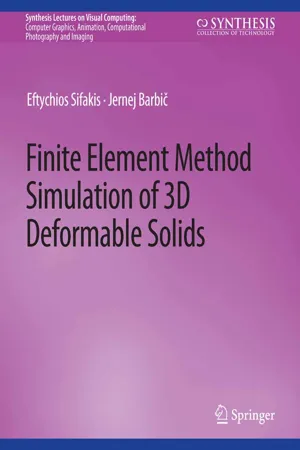
- English
- PDF
- Available on iOS & Android
eBook - PDF
Finite Element Method Simulation of 3D Deformable Solids
About this book
This book serves as a practical guide to simulation of 3D deformable solids using the Finite Element Method (FEM). It reviews a number of topics related to the theory and implementation of FEM approaches: measures of deformation, constitutive laws of nonlinear materials, tetrahedral discretizations, and model reduction techniques for real-time simulation. Simulations of deformable solids are important in many applications in computer graphics, including film special effects, computer games, and virtual surgery. The Finite Element Method has become a popular tool in many such applications. Variants of FEM catering to both offline and real-time simulation have had a mature presence in computer graphics literature. This book is designed for readers familiar with numerical simulation in computer graphics, who would like to obtain a cohesive picture of the various FEM simulation methods available, their strengths and weaknesses, and their applicability in various simulation scenarios. The book is also a practical implementation guide for the visual effects developer, offering a lean yet adequate synopsis of the underlying mathematical theory. Chapter 1 introduces the quantitative descriptions used to capture the deformation of elastic solids, the concept of strain energy, and discusses how force and stress result as a response to deformation. Chapter 2 reviews a number of constitutive models, i.e., analytical laws linking deformation to the resulting force that has successfully been used in various graphics-oriented simulation tasks. Chapter 3 summarizes how deformation and force can be computed discretely on a tetrahedral mesh, and how an implicit integrator can be structured around this discretization. Finally, chapter 4 presents the state of the art in model reduction techniques for real-time FEM solid simulation and discusses which techniques are suitable for which applications. Topics discussed in this chapter include linear modal analysis, modal warping, subspace simulation, and domain decomposition.
Tools to learn more effectively

Saving Books

Keyword Search

Annotating Text

Listen to it instead
Information
Table of contents
- Cover
- Copyright Page
- Title Page
- Dedication
- Contents
- 1 Elasticity in Three Dimensions
- 2 Constitutive Models of Materials
- 3 Discretization and Time Integration
- 4 Model Reduction
- Bibliography
- Authors’ Biographies
Frequently asked questions
Yes, you can cancel anytime from the Subscription tab in your account settings on the Perlego website. Your subscription will stay active until the end of your current billing period. Learn how to cancel your subscription
No, books cannot be downloaded as external files, such as PDFs, for use outside of Perlego. However, you can download books within the Perlego app for offline reading on mobile or tablet. Learn how to download books offline
Perlego offers two plans: Essential and Complete
- Essential is ideal for learners and professionals who enjoy exploring a wide range of subjects. Access the Essential Library with 800,000+ trusted titles and best-sellers across business, personal growth, and the humanities. Includes unlimited reading time and Standard Read Aloud voice.
- Complete: Perfect for advanced learners and researchers needing full, unrestricted access. Unlock 1.4M+ books across hundreds of subjects, including academic and specialized titles. The Complete Plan also includes advanced features like Premium Read Aloud and Research Assistant.
We are an online textbook subscription service, where you can get access to an entire online library for less than the price of a single book per month. With over 1 million books across 990+ topics, we’ve got you covered! Learn about our mission
Look out for the read-aloud symbol on your next book to see if you can listen to it. The read-aloud tool reads text aloud for you, highlighting the text as it is being read. You can pause it, speed it up and slow it down. Learn more about Read Aloud
Yes! You can use the Perlego app on both iOS and Android devices to read anytime, anywhere — even offline. Perfect for commutes or when you’re on the go.
Please note we cannot support devices running on iOS 13 and Android 7 or earlier. Learn more about using the app
Please note we cannot support devices running on iOS 13 and Android 7 or earlier. Learn more about using the app
Yes, you can access Finite Element Method Simulation of 3D Deformable Solids by Eftychios Sifakis,Jernej Barbič in PDF and/or ePUB format, as well as other popular books in Mathematics & Computer Vision & Pattern Recognition. We have over one million books available in our catalogue for you to explore.